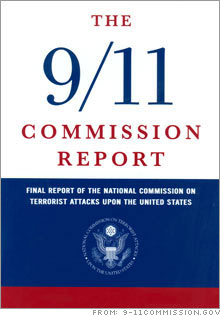NEW YORK (Fortune) -- Dependably profitable books are rare in the publishing business, and they generally come with a name like Stephen King or Harry Potter attached. But another lucrative brand of bestseller has emerged in the last few years: the instant-release blue-ribbon commission report, with the Baker-Hamilton Commission's "Iraq Study Group Report" its latest example.
The book, published by Random House imprint, Vintage, has spent six weeks on The New York Times bestseller list and has already sold over 125,000 copies, according to Nielsen Bookscan, which captures 70 percent of total book sales. That's despite the fact that the text is freely available online and was downloaded 1.4 million times from a sponsoring Web site in the first week alone.
 |
| The "9/11 Commission Report" is the most commercially successful government document, selling roughly 1.5 million copies. |
High-profile government reports can be uniquely lucrative for publishers because they are relatively cheap to produce. There are no acquisition costs, since the documents are in the public domain.
Though the publishing house authorized to print the instantly-available edition incurs extra overhead for expedited production and distribution, it also benefits from round-the-clock publicity surrounding the report's official release. The first-to-bookstores edition also has a leg up on any future versions.
"It's a profitable form of publishing, if you hit the right time and there's not too much competition," says Larry Kirshbaum, head of LJK Literary Management and former CEO of Time Warner Book Group.
To date, the 9/11 report has been the most commercially successful government document. Published by W. W. Norton in 2004, the 568-page tome was the first to be instantly available in bookstores and went on to become a colossal hit, selling about 1.5 million copies.
"Everyone was surprised by the retail performance of the 9/11 report," says Jonathan Burnham, a senior vice president and publisher at HarperCollins. "It seemed to sell to a much broader audience than ever before for that kind of material."
Even Norton was stunned by the book's runaway success, says spokesperson Louise Beckett, because it had not expected to break even on the project. Brisk sales - over 130,000 in the first week - prompted two other publishers to follow with their own editions.
So how does a publisher end up with a head start on printing a public domain text? Traditionally, these documents could be printed commercially only after their official release - which is why paperback editions of the Warren Commission and Starr reports arrived in bookstores weeks later.
But the 9/11 Commission changed the model in 2004 when, seeking instant nationwide distribution for its highly-anticipated report, it shopped around for a publisher that could offer a fast and secure turnaround, a substantial print run, and a low cover price. Norton rushed through production and distribution in just five days, no mean feat considering the process usually takes months.
Vintage was selected to publish the Iraq Study Group Report in a similar process last fall after the Baker-Hamilton Commission decided that public interest in the document warranted an instant-release copy.
Publishers typically sell books to retailers at half the cover price. Priced at $10.95, the "Iraq Study Group Report" likely brings in about $5.50 in revenues for Vintage per copy. Although the "Iraq Study Group Report" is not expected to match the 9/11 report's extraordinary sales, it will almost certainly turn a profit.
Under the terms of the publisher's agreement with the Baker-Hamilton Commission, some of those profits will go to charity. (Norton had no such terms with the 9/11 Commission but donated $600,000 to academic institutions studying crisis preparedness in 2005.)
According to commission staff familiar with the publication process, the publisher will contribute the equivalent of a royalty fee - generally 7.5 percent of a paperback's cover price - to the National Military Family Association. Kirshbaum estimates that even with about $1 per book going to charity, Vintage could still take in $400,000 in profits.
Meanwhile, other publishers are free to print the report, though only two independents have come out with editions so far. Filiquarian, a one-man publishing house that uses print on-demand technology, decided to offer both paperback and hardcover editions after 24-year-old CEO Josh Linsk read the report online. Linsk created a new imprint, Filibust, and priced the paperback at $4.99.
"One company shouldn't have the monopoly on something that's in the public domain," says Linsk, who has sold over 600 copies of the paperback edition. "I just thought there should be more options."
Bertelsmann names new CEO 